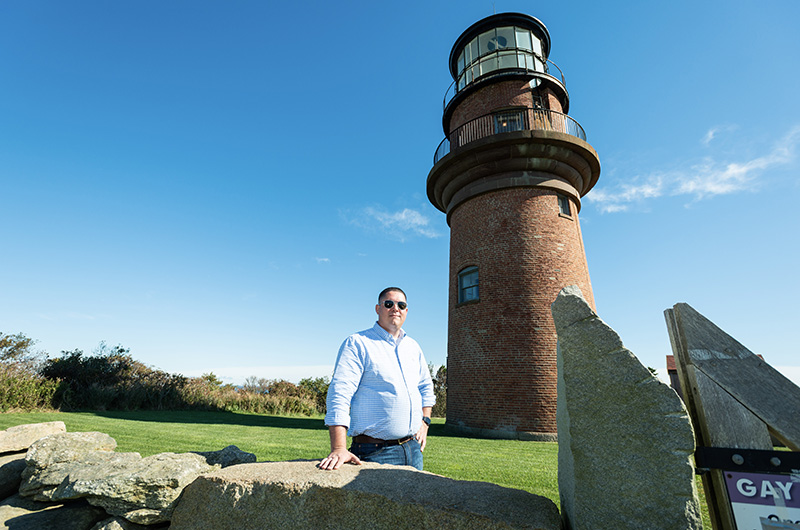Standing at the top of the Gay Head Light you can see for miles, a 360-degree view of the Atlantic Ocean, Noman’s Land, the Elizabeth islands, fishing boats trawling the waters, the foliage turning autumnal red and orange, tourists below looking out at the same view.
With eyes closed you can see even more, going back generations to when the lighthouse was first built in 1799, the light turned on in a small wooden structure on Nov. 7 of that year. In the centuries since, it has aided the navigation of countless voyages and vessels, and been saved itself in heroic relocations away from the eroding cliffs.
These views, both past and present, are what Chris Manning is looking to preserve as the new keeper at the Gay Head Light. The Aquinnah select board appointed him to the job in October, along with assistant keeper Isaac Taylor, taking over for Richard Skidmore, who kept guard over the light for 31 years.
“I have big shoes to fill coming in after Richard,” Mr. Manning said recently, standing in the lantern room of the lighthouse. “He was the longest serving principal keeper. He was the keeper when I was a child, so I grew up knowing him as the keeper. And he oversaw the relocation of the lighthouse.”
Mr. Manning, 32, is a member of the Wampanoag Tribe of Gay Head (Aquinnah) and will be the first native principal keeper since Charles W. Vanderhoop took the job in 1920.
“There were assistant keepers since then who were part of the tribe but he was the first appointed principal keeper and I am the second,” Mr. Manning said. “And I think that aspect of it is important.”
Mr. Manning grew up in the shadow of the lighthouse, staying with his grandmother June Manning just a stone’s throw away, and with his parents Paul and Theresa Manning.
“When I was a kid, I loved the lighthouse, and worked here as a tour guide in my teens,” he said. “It was literally my childhood dream to some day be the lighthouse keeper.”
But first there was the Navy. He did a five-year tour, specializing as an aircraft carrier structural mechanic, working on life or death equipment like ejection seats and fire suppression.
“A lot of that involved inspections and maintenance, making sure everything was safe,” he said. “And I think that really close attention to detail transcribes well to preserving the lighthouse for generations to come.”
After his Navy tour, Mr. Manning moved back to the Island in 2019, before the pandemic hit, he said. On the Island he works for the Wampanoag tribe as a tribal ranger, the town of Aquinnah and as a special officer with the Aquinnah police department. He is also a volunteer fireman and EMT.

“So I know what it means to be on call. I am ready to jump out of bed at any time in the night,” he said.
The lighthouse and the grounds are owned by the town, but the light is maintained by the Coast Guard.
“The Coast Guard maintains all the federal aids to navigation. So as keeper I have to interface and liaise with the Coast Guard and I speak how they speak,” he said referring to his naval experience.
The water looks calm on this particular day and the view is clear. But beauty can also be deceiving. Mr. Manning gestures to an expanse of the Vineyard Sound near Cuttyhunk.
“That’s Devil’s Bridge out there, a series of submerged glacial boulders,” he said. “The shipping traffic would transit right through there. The most famous wreck would probably be the City of Columbus which ran aground in 1884.”
These days the keeper does not have to stand watch to keep the light on at all times, which was fully automated in 1956. In a way, it is more of a keeping the light of history on, going back to what the lighthouse brochure describes as the first light, “most likely a ‘spider lamp’ of several wicks in a shallow circular pan filled with sperm whale oil” to the Fresnel lens in 1856 which revolved and flashed every 10 seconds, to the dimming of the light during World War II “as a defense measure.”
“I see this as a continuation of my service,” Mr. Manning said. “I served my country, I serve my town, and now I serve the lighthouse.”







Comments (9)
Comments
Comment policy »